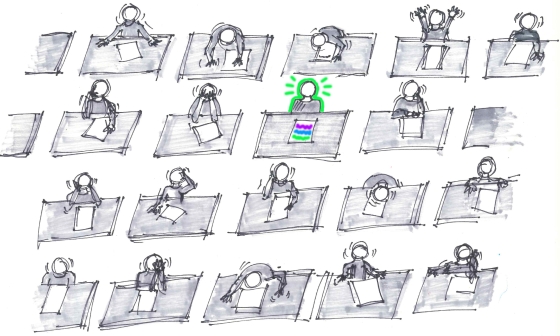TestimonialsWhat do other instructors and their students think of exam previews? Dr. Tami Caraballo (Education, University of Colorado at Denver): I LOVED the Public Exam and TQT. They are both brilliant ways to help alleviate the stress of writing and taking a good exam. They help students learn to study.... That is always so hard for them. Students tend to focus so much on grades and exam passing that the concepts fall off their radar. It is a much better 'review' than I could ever write and eliminates the idea that you are trying to test with 'trick' questions. Dr. Lauren Crowe (Biology, Tufts University): I have been using a modified version of public exams for my large (>500 person) introductory cell and molecular biology course for 3 years now. I think one of my favorite things is that it has enabled me to maintain in-person exams in the age of AI and still approach exams with an equity-based mindset to help lower testing anxiety and scaffold multiple-choice test-taking skills. Julie Gallagher (Biology, Barstow Community College): In designing a new accelerated online physiology course, I really wanted the course assessments to mimic the AP Biology style of assessments. I wanted them not only to be aligned with course objectives, but to require students to think about and demonstrate the skills and concepts they were learning. I was skeptical, but hopeful I could also find an approach in which I would not have to rewrite the entire examination from scratch each term. In my search for related pedagogies, I ran across an article in the May 2020 HAPS Educator, "Testing in the Age of Active Learning: Test Question Templates Help to Align Activities and Assessments," and recognized the name of one of the authors, Dr. Greg Crowther (Everett Community College, Everett, WA) from a previous association. I reached out to Greg and requested some more details about Test Question Templates (TQTs). What I found was a pedagogical gold mine! ...Not surprisingly, students who participated during the week and spaced-out lecture segments, formative assessments and TQTs did much better on the examination than those who did not. It has taken several examinations to convince many of the students that physiology is not simply about googling or memorizing facts, but about developing critical thinking skills and a higher-order understanding of the material that will persist beyond the course. More students are now actively preparing, studying and asking more complex questions throughout the week than previously (as evidenced by Canvas analytics and student contact). Many have shown improvement not only on their overall exam scores, but in their demonstrations of reasoning on assignments and exams. After the initial rough weeks of getting students on board, students are now reaching out via email to report progress in their learning, growth, and ability to connect the material to their work as CNAs and Medical Assistants. For example, one young man in the course writes, "As we've progressed onward to future chapters I feel like my knowledge is increasing gradually and I personally feel that like I CAN do this, it has been a struggle I'm not going to lie and say it was a breeze but, I feel like I'm truly getting a ton of knowledge from these chapters, I've found much interest on the systems we've been studying especially with the TQT examples and formative questions that you help me with your feedback." Another young lady states, "I am sorry I am not doing well. I have never been forced to study before and though the TQTs are hard I am finding that I am learning a lot and am really interested in learning more. I am glad I didn't give up." ...These approaches have also given me insight into student misconceptions and helped me provide feedback, remediation, and other support as needed. I can easily write (or rewrite) questions based on the TQT input/output statements without having to rewrite entire examinations each term. Students are learning that simply googling will not let them ace the exams; instead, they are learning to more carefully read the questions and answer the questions based on their own understanding. Dr. Heather McDonald (Geology, College of William & Mary): I adapted the public exam approach for an in-class review session and the exam itself. Students made good suggestions for clarification of exam questions and were more confident going into the exam having worked through some aspects of exam questions with some feedback from me in an all-class discussion. Public exams were better for students and better for me. Dr. Usha Sankar (Biology, Drexel University): I have used TQTs with students in my classes and found that it is a great way to get students thinking about what kind of questions can be created from the material they are learning about. It is an excellent way to get students to engage deeply with the material. Dr. Mandy Schivell (Biology, University of Washington): Using public exams in classes of 400 and 800 students reduced student anxiety and improved study skills. Students reported having an easier time knowing where to start their studying and feeling more confident about what questions were asking since the phrasing had been edited by the whole class. Many students reported feeling like they studied more deeply since they had specific scenarios to think about ahead of time. Students provided excellent possible questions of which I chose a few for each exam. I will definitely keep using Public Exams. Here are some of the student comments in my official evaluations:
For more information about this project, please email us at exampreviewresearch@gmail.com. 
|